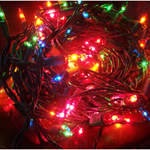This holiday season, the Washington University in St. Louis community can bring burned-out or unwanted light strings to campus to be recycled.
WUSTL’s Office of Sustainability and the Sustainability Action Team at the School of Medicine are partnering with
StLouisGreen.com and Operation Food Search on the initiative, which begins Saturday, Nov. 16, and runs through Jan. 12.

All materials collected will be 100 percent recycled. The lights are processed by Metal Exchange, a local company that uses a special machine to crunch and separate the lights into their constituent materials: copper, glass and plastic, explained Will Fischer, of the Office of Sustainability. The materials are then recycled and sent back to manufacturers to be used in new products.
Last year, St. Louis Green collected 117,000 pounds of lights, and it hopes to collect 136,000 pounds this year. Proceeds from the program will be donated to Operation Food Search.
Several donation boxes will be located at three WUSTL campuses:
Danforth Campus
• Gregg House, Student Technology Services
• Bixby Hall, School of Art office, Suite 1
• Danforth University Center, Event Services, Room 322
• Alumni House
Medical Campus
• McDonnell Pediatric Research Building lobby
• 4444 Forest Park Parkway lobby
• 4480 Clayton Ave. lobby
• Clinical Sciences Research Building and BJC Institute of Health link
• Farrell Learning and Teaching Center lobby
• McDonnell Sciences Building, seashell lobby
• Clayton Garage
West Campus
• 7425 Forsyth Blvd. Third floor across from the elevators (managed by Information Services & Technology)
LED holiday lights
To make the holiday season more environmentally friendly, the Office of Sustainability encourages the WUSTL community to consider buying LED holiday lights rather than incandescent lights. Benefits include:
• LED holiday lights use up to 90 percent less energy than incandescent bulbs to produce the same amount of light;
• LED lights can last up to 10 times longer than incandescent bulbs;
• LED lights are more durable than incandescent bulbs;
• LED lights reduce fire risk. Incandescent holiday lights transform only about 5 percent of the power that they use into light, while the rest is emitted as heat; and
• Colored incandescent holiday lights are the least efficient, with as little as 1 percent of energy being converted to light.
 All materials collected will be 100 percent recycled. The lights are processed by Metal Exchange, a local company that uses a special machine to crunch and separate the lights into their constituent materials: copper, glass and plastic, explained Will Fischer, of the Office of Sustainability. The materials are then recycled and sent back to manufacturers to be used in new products.
All materials collected will be 100 percent recycled. The lights are processed by Metal Exchange, a local company that uses a special machine to crunch and separate the lights into their constituent materials: copper, glass and plastic, explained Will Fischer, of the Office of Sustainability. The materials are then recycled and sent back to manufacturers to be used in new products.